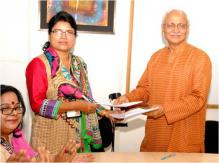 A Memorandum of Understanding (MoU) was signed between The Hunger Project-Bangladesh and BRAC‘s Community Empowerment Program and Integrated Development Program on March 18, 2014 at BRAC Center in Dhaka.
A Memorandum of Understanding (MoU) was signed between The Hunger Project-Bangladesh and BRAC‘s Community Empowerment Program and Integrated Development Program on March 18, 2014 at BRAC Center in Dhaka.
Present to witness the MoU signing was The Hunger Project-Bangladesh Global Vice President and Country Director Dr. Badiul Alam Majumdar and BRAC Community Empowerment Program & Integrated Development Program Anna Minj.
BRAC Community Empowerment Program (CEP) and The Hunger Project-Bangladesh started a two-year partnership project, beginning February 2014 until December 2015, with the aim of strengthening Union Parishads for transparent, accountable and inclusive governance at the local level in order to accelerate the achievement of the MDGs.
At the signing event, Anna Minj expressed her joy and thanked The Hunger Project for initiating and continuing a remarkable partnership. She is hopeful that it’s a new category of partnership and a relationship for strengthening good governance activities to improve the condition of rural Bangladesh. She expressed confidence that the project will be successful. The Hunger Project and BRAC have the opportunity to work together for Sustainable Development Progress (SDP) in the future too, she added.
Dr. Badiul Alam Majumdar acknowledged BRAC for staying confident in the partnership with The Hunger Project. He expressed his hopefulness that this initiative will be helpful to bring change at the policy level in a positive way for strengthening local government structure and rural activities in Bangladesh. He said, “We have the opportunity to set an inspiring example for the Bangladesh Government through this initiative.”
As a team, Dr. Badiul Alam Majumdar explained that The Hunger Project and BRAC are going to engage Union Parishads in carrying out their mandates in an attempt to create a rural citizenry that holds up and promote the MDGs. The partnership will work to advocate with relevant local and national level actors, including policy makers, to ensure support from the government in adopting project learning and institutionalizing best practices.
The project will be implemented in 14 Upazilas across 3 Divisions, 4 Districts and comprising 61 Unions (12 Unions of Kishoreganj Districts of Dhaka Division; 16 Unions of Bagerhat District of Sylhet Division; 33 Unions of Sunamganj Habiganj Districts of Sylhet Division).
March 18, 2014
